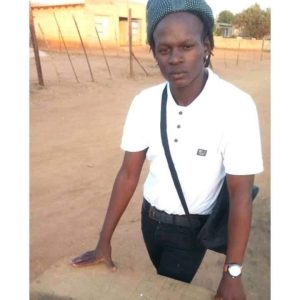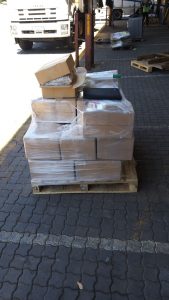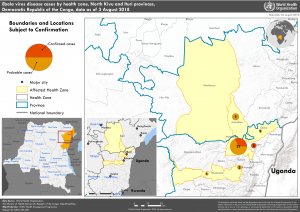StaffingWith infection surges in hotspots expected, swift assignment of COVID-19 experienced doctors and nurses is crucial to under-resourced areas
After sending a team of health care workers to assist hospitals facing a COVID-19 crisis in Eastern Cape, Doctors Without Borders (MSF) is urging the National Department of Health to improve its national emergency response capacity by ensuring that medical staff can be rapidly assigned to developing COVID-19 hotspots throughout the country to fill critical staffing gaps.
According to MSF, the public health system in the Nelson Mandela Bay Metropolitan Municipality in the Eastern Cape reached the brink of collapse in November due to a catastrophic shortage of human resources unable to handle a surge in COVID-19 cases.
“COVID-19 is a fast-moving pandemic that is very human resource-intensive, whereas South Africa’s health system is bureaucratic and often hampered by staffing shortages. To save lives and provide essential care a more agile way of responding to COVID-19 outbreaks is urgently needed,” says Dr Colin Pfaff, medical coordinator for MSF in Port Elizabeth.
Pfaff adds that after responding to COVID-19 in Khayelitsha in the Western Cape in June, Butterworth in the Eastern Cape in July and now in the Nelson Mandela Bay Metro, MSF has learned that a rapid assignment of doctors and nurses with COVID-19 experience is an effective way to prevent unnecessary deaths when a COVID-19 wave hits under-resourced areas.
“They need to be willing and able to immediately travel and rapidly integrate with existing facility medical teams, as the intense wave of infections will typically have passed in just a few weeks,” he says.
In mid-November, the team of 20 MSF-employed doctors and nurses that travelled to the Nelson Mandela Bay Metro were rapidly integrated in Livingstone Hospital and the Rev Dr Elizabeth Mamisa Chabula- Nxiweni Field Hospital – a large Volkswagen manufacturing plant that has functioned as a COVID-19 field hospital since late June.
During the last week, there has been a reduction in the number of new COVID-19 cases registered in the Nelson Mandela Bay Metro and the situation in facilities has stabilised slightly, although promised human resources have been slow to materialise and the system remains deeply stressed. Meanwhile, additional hotspots have emerged in parts of the Eastern and Western Cape provinces and MSF believes the likelihood of many more hotspots developing is high. With facilities across the country experiencing shortages of critical staff after a bruising first COVID-19 wave, a repeat of the Nelson Mandela Bay Metro crisis in other parts of the country is a real risk.
According to Dr John Black, head of the infectious diseases division at Livingstone Hospital, additional doctors and nurses from MSF arrived at a time when there were more patients with severe COVID-19 disease coming in than at the peak of the first wave, but fewer doctors and nurses as a result of burn-out and other issues.
“The additional human resources enabled us to elevate our own response with the opening of a new COVID-19 ward for high acuity patients in the basement of the hospital, which had been standing empty due to a lack of doctors and nurses to staff it. This has helped us to decongest and stabilise our point of care ward. Similarly, the support of MSF staff has helped to decongest the large field hospital, freeing up more beds and enabling other hospitals to refer some of the patients they are unable to manage,” he says.
Pfaff says that there are enough doctors and nurses with COVID-19 experience willing to take part in emergency response interventions. “We know this because we received over 30 solid applications after we advertised for doctors and nurses to join our intervention in Port Elizabeth.”
A system is needed to coordinate these available human resources (and mobilise additional capacity) as soon as a hot spot is identified, according to MSF.
“MSF is happy to help deploy our emergency teams, when possible, but as a non-governmental organisation our capacity is limited and responding to COVID-19 outbreaks forces us to remove staff from our existing projects, which provide life-saving care for patients with other conditions, such as HIV and tuberculosis,” says Pfaff. “South Africa has the available resources to respond to COVID-19 hotspots but currently lacks the planning and coordination to activate those resources in time. This can change but it needs to be done swiftly.”
#ENDS#
In order to be ready when the first wave of COVID-19 infections hit Khayelitsha in the Western Cape in June, MSF partnered with a local hospital on the development of a 60-bed field hospital, making use of pre-existing support systems as a way of reducing set-up time. When the first wave hit the Eastern Cape in July and August, MSF was able to rapidly deploy staff and equipment to Butterworth District Hospital to support the Butterworth District Hospital to cope, and staff were similarly deployed in two district hospital in rural KwaZulu-Natal. The current MSF team in the Nelson Mandela Bay Metro comprises 5 doctors, 2 clinical assistants, 2 clinical nurse practitioners, 4 professional nurses, 6 enrolled nurses, and a volunteer technical consultant from the University of Cape Town’s emergency medicine division. The MSF team will continue to support facilities in the Nelson Mandela Bay Metro until 31 December.








